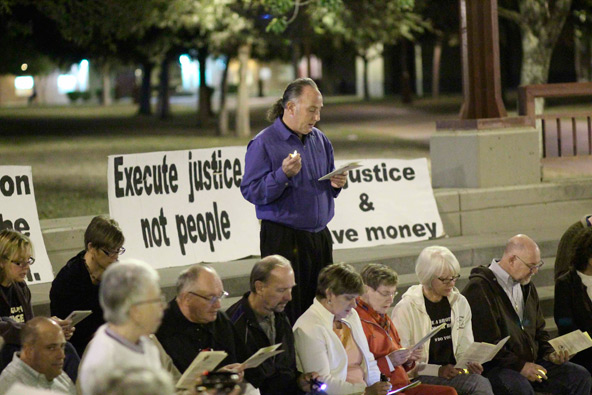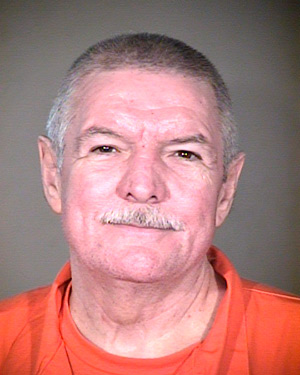
Randy Brazeal and Richard Stokley brutally raped and murdered two 13-year-old girls July 8, 1991 near Elfrida, Ariz.

Stokley became the sixth man executed by the state of Arizona in 2012 at 11 a.m. this morning in Florence. Brazeal lives with his family in Arkansas.
“We have to look at how we pursue justice,” said Fr. John Bonavitacola, pastor of Our Lady of Mount Carmel Parish in Tempe. He joined around 40 others who gathered Dec. 5 to pray for the victims, their families, for Stokley and for the end of the death penalty outside the Burton Barr Central Library.
“There’s another way that we can bring peace to society as a whole,” he said, warning against giving too much power to the state — like the power to execute. “The Gospel calls us to seek justice and mercy. We cannot let vengeance motivate us.”
Those who gathered at the vigil noted that Stokley waived his right to a clemency hearing, where he could have argued for a stay of execution or a commutation of his sentence. Stokley, 60, didn’t decline the hearing because he felt he deserved the death penalty.
“With all due respect, the fact is, it just does not appear that the state really cares about things like showing mercy,” Stokley wrote in a letter to the Arizona Board of Executive Clemency. As evidence, Stokley spoke of Robert H. Moormann, who he called “a child in an old man’s body.”
“He cried out for compassion, yet it was coldly denied,” Stokley wrote of Moorman, who was executed Feb. 29 of this year for the brutal killing of his mother in 1984.
In the summer of 1991, Stokley and Brazeal took Mary Snyder and Mandy Meyers to a remote area in southern Arizona and raped them. They decided to kill them so they wouldn’t face the consequences. They strangled and stomped on the girls before stabbing them and then throwing their bodies down a water-filled mineshaft.
Brazeal turned himself in later that day and police arrested Stokley in Benson.
Eyewitness accounts and forensic evidence indicate that Brazeal planned and instigated the rapes and murders of the two girls, Stokley’s attorneys explained in a petition to the U.S. Supreme Court to stay the execution.
Stokley had a documented history of traumatic frontal blows, including losing consciousness as a child, getting hit by a brick, an iron skillet, head trauma from a motorcycle accident, a carjack to the face, a rock climbing accident and a cast-iron frying pan. He also had a history of mental illness, suicide attempts and depression.
On the night of the murders, Stokley was looking for a ride to an outdoor water tank so he could bathe. Brazeal agreed to take him there. On the way, Brazeal stopped to pick up the girls, who he’d arranged to meet up with on the side of the road.
According to Stokley’s account, which is consistent with the forensic evidence, Stokley was dropped off at the water tank to bathe. Stokley searched for Brazeal’s car after his bath. He found Brazeal raping one of the girls in the back seat. Stokley raped one of the girls and then, with Brazeal, killed them both.
“I have made grave an irreversible errors, and, though I believe that life is worth saving, this board in its current mindset and philosophical leaning will never agree with me, or any death row prisoner,” Stokley wrote in his letter to the clemency board.
“I hate to think there are not at least some of us worth saving,” he added. “I have been sorry for the victims and the victims’ families. But no one wants to hear of my miserable sorrow. They just want me to get dead, which is vengeance.”
Brazeal’s trial was held before the results from the DNA testing had been finalized. Brazeal pled guilty and received 20 years in prison, despite evidence that he was more culpable of the murder.
The county prosecutor, who agreed to Brazeal’s plea deal, rejected Stokley’s offer to plead guilty and serve life in prison. “Following a sentencing hearing, the trial court imposed two sentences of death on Stokley, even though it found beyond a reasonable doubt that Brazeal had actually killed one of the victims,” Stokley’s attorneys wrote.
Stokley — like Daniel Cook, who was executed in August and Robert Towery, who was executed in March — died in prison while his co-defendant was free. Towery’s co-defendant, Randy Barker, received a 10-year sentence. Cook’s co-defendant, John Matzke, received a 20-year sentence.
Dennis Seavers, spokesperson for Death Penalty Alternatives for Arizona and a parishioner at St. Andrew in Chandler, said the last time Arizona executed six inmates was in 1999, when the state executed seven. Stokley is the 34th person to be executed in the state since 1992.
Seavers expects executions to increase next year.
“I guess not so much for me do I write this letter, because my time appears short,” Stokley wrote the clemency board. “But I think of all those to come. I sure hope you folks can find mercy in your hearts. I know it must be a tough job that you have. I just would really appreciate it if you would hear my words and consider them in making decisions.”
Some at the vigil expect Edward Harold Schad will be the next inmate to be scheduled for execution. Schad was found guilty of the 1978 murder of 74-year-old Lorimer Graves of Bisbee, Ariz.
PREVIOUS COVERAGE:
EDITORIAL: Opposed to the death penalty
Tortured lives: Arizona executes fifth death row inmate this year
Arizona executes fourth death row inmate this year
Dozens protest death penalty on eve of execution
Bishop Thomas J. Olmsted: The Catholic Church and the death penalty






